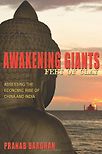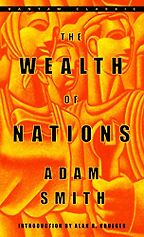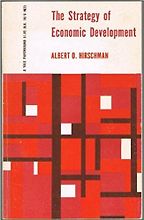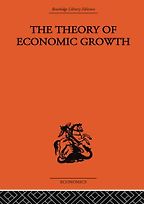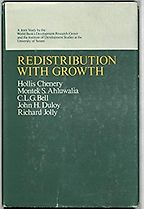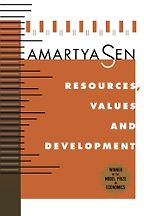Tell me about your first choice, The Wealth of Nations by Adam Smith.
The reason I included The Wealth of Nations in my choices is because I see this as one of the major books in the world of development economics. At the time Adam Smith was writing Britain was a developing economy. It was around the time of the Industrial Revolution. And there are many things in the book which remain important even today. Often this work is misinterpreted. For example, he is widely cited as a market fundamentalist which he was not. He is regarded as the guru of greed – greed that is supposed to propel a capitalist economy, which is quite the opposite of his intention, as you can read from parts of this work and his preceding book, The Theory of Moral Sentiments.
The problem is, he is always quoted from a very small part of The Wealth of Nations in which he is trying to explain economic exchange. But the rest of the book and the other book are about the whole plurality of human motivations. When he is explaining economic exchange he is saying self-interest alone is enough to get an exchange. But he is talking about what is the minimum assumption on which one can get an economic exchange rather than that this is what human beings are like, which is what many people took it to mean.
“At the time Adam Smith was writing Britain was a developing economy.”
Economic exchange is only one part of the subject of economics; another part is how goods are distributed, and he showed a great deal of concern for the poor. He wasn’t happy with how poverty relief in Britain was being carried out at the time. He was also in favour of free education. Once you concentrate on the other parts of his work you see he is focusing on economic development which is about improving the living standards of the masses of poor people.
Your next book is The Strategy of Economic Development by Albert Hirschman.
With this book we are now skipping almost 200 years to the middle of the 1950s. Albert Hirschman is a European intellectual who migrated to the United States. This book was written after his wide experience in Latin American policy-making for economic development. The reason I cite this book is that he is one of the early proponents of what in recent years has been revived as the political-economy approach to development.
“A great deal of my China-India book deals with political economy in both countries.”
Economics has made a big transition. In Adam Smith’s time, and even later on with other classical economists, they were not just interested in economics per se but also in the political basis of economics. But then from around the end of the 19th century for many decades the focus of economics was narrowed down to purely technical economic analysis, leaving aside the political basis of economic decisions and happenings. However, in more recent years the earlier tradition has been revived, of looking at it from the political point of view as well, in order to understand the political background and underpinnings of economic policies.
In the last 25 years there has been a great deal of work in development economics in this area, which is also my own area of interest. A great deal of my China-India book deals with political economy in both countries.
Your third book is The Theory of Economic Growth by W Arthur Lewis.
He was the first Nobel Prize-winner in the subject of development economics. He was also very much rooted in classical economics of the political-economy tradition as well as the classical economist’s concern with structural transformation of a developing economy.
In the early days economies are primarily agriculture-based and then at some stage the transition takes place to go from agriculture to other, more productive, sectors of the economy, primarily to industrialisation. The book emphasises the specific problems of this process as people get more and more absorbed in the industrial sector. But he doesn’t just point to the historical pattern, he also suggests some advantages arising out of the agrarian origins of industrialisation.
“China is a good example of what Arthur Lewis was writing about – the advantages of low wages in the early stages of development.”
For example, on the basis of a relatively low wage, which is the case in the low-productivity agricultural sector, you can get a lot of people to work in industries, keeping unit labour costs down and thus raising profits from industrial investment.
Is this something you have seen happening in China and India with your research in that area?
Yes, particularly in China. Their success from the 1980s until very recently has been in labour-intensive industrialisation, in products like garments, shoes, toys and wigs. China is now widely regarded as the manufacturing workshop of the world. Over time they graduated into the labour-intensive part of the production of otherwise technical products like mobile phones, laptops and digital cameras. China is a good example of what Arthur Lewis was writing about – the advantages of low wages in the early stages of development. But the wages in China are now increasing and that’s what Lewis expected to happen in the transition process of development; after what he called the surplus labour in the agricultural sectors gets relatively exhausted wages rise and there are demands for improving the work conditions.
Get the weekly Five Books newsletter
He was describing this process as it historically happened and he was observing it happening in developing countries as we see it happening in China today. To some extent this is happening in India as well but less so than China because India’s success stories are more in skill-intensive industries like software and pharmaceuticals. That is one of the reasons why Indian poverty is now higher than China’s because labour-intensive industries create jobs for poor people but the skill-intensive ones don’t.
Tell me about your fourth book, H B Chenery’s Redistribution with Growth.
This is actually edited by a group of people – one of the major editors is Chenery who used to be the vice-president of the World Bank and also a major development economist. It grew out of a conference that took place in the 1970s in Bellagio, Italy. It represented a major new direction in developmental economics, which was already happening but this was a landmark. There was this new focus of developmental economics into issues like poverty eradication and income and wealth inequality, and the conference participants looked into the question of how to have equity along with growth.
Quite often growth increases inequality, as we see in China and India today. This book was about trying to understand how, while there are processes inherent in economic growth which lead to more inequality, one can achieve growth as well as better equality. That is why it is called Redistribution with Growth. And this is something which is very important in economics. Much of mainstream economics posits a trade-off between equity and efficiency. If you want more equity, you have to give up on efficiency.
“One of the reasons why Indian poverty is now higher than China’s because labour-intensive industries create jobs for poor people but the skill-intensive ones don’t.”
So this new approach didn’t deny that there is often a trade-off but it tries to look into certain patterns of economic growth which improve equality. For example, if types of development policy improve the access of poor people to education, better health and better access to credit, this will improve growth as well as improving the conditions of the poor. Land reform is another example. If you reduce the inequality of the land distribution this will give an incentive for production to a lot of poor peasants. I was quite young at that time but I participated in the conference out of which this volume grew and I have a short piece in the book.
Your final author, Amartya Sen, is also interested in improving the economic situation for the poor. What does he tell us about that in his book Resources, Values and Development?
Like Arthur Lewis, but a long time later, Amartya Sen also got the Nobel Prize in development economics. There are many books by him in this area but I chose this one as representative of many of his ideas.
It is a collection of the essays he has written over many years so it covers his various interests in this field. He also belongs to the tradition of paying attention to improving the access of the poor. He is very interested in the issues of equity. He also follows the Adam Smith tradition of economics in that he tries to bridge ethics and economics. For many years his appointments have been jointly in departments of economics and philosophy. In development economics he looks at education and health improvements for the poor as well as women’s autonomy and the larger issues of democratic freedom being an integral part of development.
Do you think what he wants to do is wishful thinking or is it something you see playing out in countries like China and India?
No, I don’t think it is wishful thinking. I see it playing out particularly in education and help for the poor. Chinese achievements in this respect have been much better than in India. And this is something that I have looked into in my latest book, Awakening Giants, Feet of Clay: Assessing the Economic Rise of China and India. I find that usual discussions about China emphasise globalisation and market reforms but don’t emphasise the legacy of the earlier period in China when they focused on basic education and basic health for the poor. This earlier groundwork is something that today’s China is deriving the benefit from.
I have seen that this didn’t happen in India to the same extent and because of this poverty reduction in India has not been as dramatic as in China. This brings me to an often ignored question of the socialist legacy of emphasising education and health, which Amartya Sen has always been quite emphatic about and the Chinese case has been a good example of that.
And what about your research into China? Have you found that developmental economics has a big role to play there?
Well, when I was working on Awakening Giants, Feet of Clay I wasn’t writing for economists but for a general readership. And I wrote it partly out of a slight irritation with all the glowing accounts in the press about India and China. I thought that some of this is correct but some of it is hype and exaggeration.
The financial media repeat the same things so often that they become part of conventional wisdom. So I set out to qualify that and challenge some aspects of this wisdom. For example, the dramatic reduction of poverty in China, as I mentioned in connection with Redistribution with Growth, has a lot to do with the redistribution of the land in the early 1980s which enabled peasants to become richer. China moved to something called the household responsibility system, which meant peasants had user rights to lands. Every rural family had an almost equal amount of land which provided a basic floor for their incomes. This was some years before globalisation in China really took off.
“I don’t see authoritarianism as necessary or sufficient for development and I think it has distorted the patterns of development.”
Everyone thinks globalisation is the reason India and China have been so successful. Of course, that is a part of the reason but not all of it. Similarly—and this is something I have mentioned with my choice of five books—often it is not recognised that China didn’t actually go the whole hog when it came to privatisation and market reforms. They haven’t privatised many of the state-owned companies which are now very important in the world economy. Also, in India there has been some privatisation but not very much. So in that respect the usual orthodoxy—that it is those private ownership rights and market reforms that are the reasons for China and India’s high growth and poverty reduction—is only partly true.
Five Books interviews are expensive to produce. If you're enjoying this interview, please support us by donating a small amount.
And, finally, there is this other myth, which is propagated by the Chinese leadership and the élite, where the enormous success of China is held up as an example that in the early stages of development authoritarianism, which we have in China, is seen to be necessary and good for helping economic growth. I think this is something that should be challenged. I don’t see authoritarianism as necessary or sufficient for development and I think it has distorted the patterns of development. Suppression of information in China has meant that some of the capitalist excesses that are taking place (relating to the environmental damages, land-grabbing from the poor farmers and violations of product safety and work condition standards) are because of lack of democratic accountability in China.
India is much more democratic than China. But, there is still a problem with democratic accountability in India. It works relatively well in upper tiers of government but on a local level there are still problems. For example, if money is given for something like education or health often the local leaders will siphon it off and it won’t reach the people it was intended for. This, for me, is one of the reasons why India hasn’t done as well as China in matters such as education and health. The local élite who run local governments are not taking responsibility for making the projects work. So accountability failures in India are also causing problems. And this is in line with what Amartya Sen says. He emphasises not merely education and health but also the importance of democracy in achieving broad-based development.
Five Books aims to keep its book recommendations and interviews up to date. If you are the interviewee and would like to update your choice of books (or even just what you say about them) please email us at [email protected]

